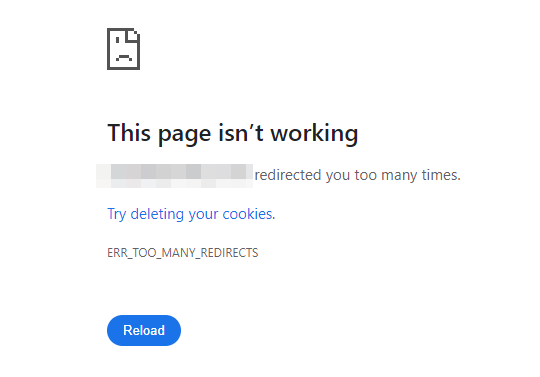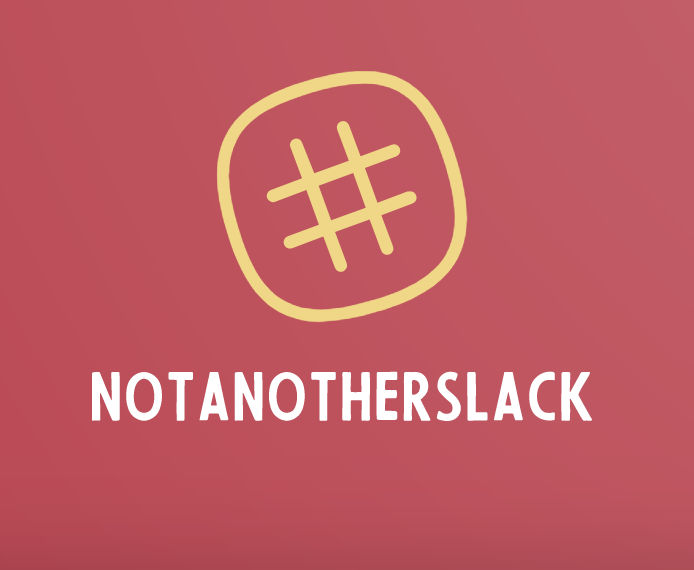Considering what's taken place around the world during the past 16 month it's no surprise to hear there’s been a surge in interest in finding a good SEO specialist.
With the impact of Covid-19 being felt hard by both people and businesses across the globe, one clear result of this has been a big shift online as people have been confined to spending more time at home during the enforced lockdown.
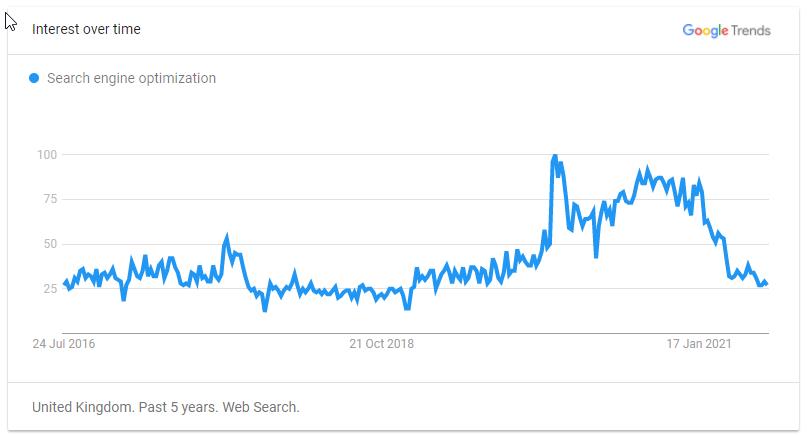
Google Trends data showing the increase in demand for SEO searches in the UK during the past 5 years.
Businesses have been very quick to adapt and have been forced into making more pivots than a ballerina in order to survive.
Brands have tried hard to ensure that their products or services are available to purchase online, to ensure they’re able to survive the inevitable drop in visitations to their stores or premises.
They were also fast to realise that it’s now not enough to just have an online storefront of some kind - what good is a website if nobody is able to find it?
And when you consider the growing size of the internet, there are all number of other businesses you’ll find yourself competing with.
This is where the demand for good quality SEO freelancers or SEO consultants has seen huge growth. These businesses have been looking for people that can help to ensure their website can be found when someone’s in the market for whatever it is they offer.
And this isn’t to say that SEO wasn’t in demand prior to Covid-19 taking place; during the past few years as there’s been a big shift online around the world, and as ecommerce has continued to grow, search marketers have continued to help make these websites more search-engine friendly.
So - if there’s already been a big demand for SEO professionals and the impact of Covid-19 has seen this grow several fold, this paints a fairly bright picture for those people looking to begin a career in this field too.
Why become a Freelance SEO Specialist in 2021?
There’s a massive appeal to becoming a freelance SEO specialist, or any kind of digital freelancer come to think of it.
Not only are you going to see a big improvement in your work/life balance, but you can afford yourself a huge amount of flexibility in the way in which you operate.
As someone who’s now lived in their 4th country (UK, Ireland, Germany and now Spain), living the freelancer lifestyle has enabled me to travel fairly lightly - armed just with my laptop as a kind of mobile-office.
I count myself extremely lucky that I’ve been able to see and live in some amazing places, whilst not having to worry about being unavailable for work.

Photo I took during a hiking trip in Graubünden, Switzerland
I lived in Southern Germany for a few years, just an hour or so drive from places like the above, in Graubünden, Switzerland.
I did still have commitments to keep - I wouldn’t just disappear completely without warning - but prior to Covid-19 taking place there was so much freedom in being a freelancer. Hopefully that returns fairly soon too as we slowly head back to normality and everyone gets their vaccine.
There’s also a growing community of digital freelancers that have come to identity as digital nomads. Whilst I understand the appeal, it’s not really a movement I identify with - I prefer to set down roots and not constantly be on the move. Having a young family makes that lifestyle harder for us (but not impossible!).
Show me the Money! - What can I earn as an SEO Freelancer?
Outside of the luxury of being able to move freely whilst you’re living the freelancer lifestyle, another clear advantage is that you have many more opportunities to increase your income.
In a typical SEO role you’d be expected to have a set salary, which for an experienced SEO specialist you might expect around £40,000 per year. That varies a lot according to your location. In the US I believe salaries for a decent SEO are a fair bit higher than those in the UK. I guess there are also many more expenses in the US, healthcare being an obvious one.
You’d also be dedicating most of your working time to the company, with little free time for living your life, let alone any side-projects.
Whilst for some that’s a great appeal (having a clearly defined salary or income is something to envy at times), as a freelancer you have the ability to earn as much as you want, with the obvious caveats.
If your skills are in high demand there’s no reason why you can’t just increase your asking rate. Many freelancer experts will encourage you to always review your rates and try to increase them regularly as you and your business grow.
The exact rate you can expect to earn as an SEO freelancer or SEO consultant is going to be dependent on a number of factors:
- Which fields will you specialise in?
- What will your target client look like?
- How will you offer your services (monthly retainers or project-based fees?)
- Where are most of your clients based?
Lastly, as a freelancer you simply can’t replace the freedom you will have compared to a normal 9-5 job.
How many companies would honestly allow their employee to disappear for a few hours on errands, or have the odd day off when you’d rather be outside enjoying the weather, or to even go on a bit of a working holiday at short notice?

Sometimes it's hard to resist a short break from work for a trip to the local beach
When you do make the jump to become a freelancer having worked in an agency or in-house environment, for some the freedom might almost be too much.
It requires a huge amount of discipline to set yourself up and to get the most out of your working day. There’s no-one else to stand over your shoulder and spoon-feed you whatever it is you need to be doing.
Ultimately it all falls on your shoulders - so you need to be able to organise yourself and to avoid the pitfalls of going solo.
The other question to ask yourself is - how much would you be willing to pay to have this level of freedom available to you? Would you forgo the benefit of having a set yearly salary, for example?
You’ll soon come to discover the “feast or famine” element of freelancing, where there are times of constant work followed by those quiet spells of nothingness. Personally I've never been busier than ever, and I don't think there's any kind of shortage of work.
Finding your first paying clients as an SEO freelancer
I think for many people this will be the biggest worry, and even as a fairly well established SEO specialist I also have the odd concern in this regard. What if the work suddenly dried up?
As someone looking to begin their SEO career in 2021, I probably wouldn’t suggest that they start out as a freelancer without any prior work experience.
I was lucky enough to have learned the basics of SEO from my bedroom as a teenager, where I built my own websites and later optimised them for Google, earning a fairly decent living from advertising revenue and affiliate marketing. The first site I built I managed to rank first in Google.co.uk for "make money online", as well as "paid surveys" and "cashback websites". That was a small site about genuine ways to make a living online. I later sold this privately, and then moved onto a few other hobby sites.
Whilst this early experience got me started and helped me to begin my career, I don’t think I’d have fared too well if I hadn’t had the chance to work within another, "proper" company.
I was extremely lucky and found an internship with a brilliant company based in Dublin called Bookassist. In this role I learned more about Pay-Per-Click (PPC) marketing on Google, and got the chance to apply my SEO skills across a range of websites that were all under their control.
Learning about client and account management, working as part of a small but great team, understanding more about what makes a good SEO service - these were all invaluable skills that gave me a very good grounding in this field. Ciaran Rowe, Mary Collins and team first introduced me to Screaming Frog - a piece of software I now couldn't go without.
I later was offered a permanent position and a subsequent promotion, but after a few years I’d decided I wanted to give the freelancer lifestyle another shot. For me as a pretty big introvert there were a few too many client meetings for my liking! Meetings always meant more work, and I struggled a bit with the pace of that.
Many people who go from working fulltime in an agency to beginning a consultancy or freelancer SEO role are able to use their network of connections to promote themselves and to share their change in career path - which can be a great way for them to find work.
However if you didn’t come from that background, or you’re looking to get started, you’ll likely have to go a slightly different route and find your own clients unless you’re lucky enough to find a decent internship like I was.
The Rise in Freelancer Job Platforms
This is how I initially got my first break - whilst I did have a few years decent work experience under my belt, I’d have been unable to find work from my fairly limited network. The clients I'd worked with previously wouldn't work with a freelance provider like myself, because in that industry (travel/hotels) most of the services were provided by all-in-one solutions from other software vendors.
Instead, I made use of some of the freelancer job platforms that have risen in popularity massively over the past few years to pickup my first paid work.
I began using a fairly big UK freelancer platform called PeoplePerHour. This was where I picked up my first few clients, offering them hourly SEO services at a very affordable rate.
PeoplePerHour take a huge percentage of any work that came through the platform, with 20% of anything I invoiced going to them as a kind of “finders fee”.
Whilst it’s true that the invoicing and admin elements were managed by the platform, and that I found work through the site, I still wasn’t happy paying them such a huge chunk of my rate. I think it's risky if you do start off with your first clients here as it may be a hard trap to escape from.
Businesses on the other hand discover these platforms fairly easily, ironically through Google search queries like “SEO freelancer in London” or “SEO freelancer to hire”.
Google loves these types of sites because they really meet the user’s search intent - someone is looking for a service, and these sites act as a kind of matchmaker, connecting businesses with service providers.
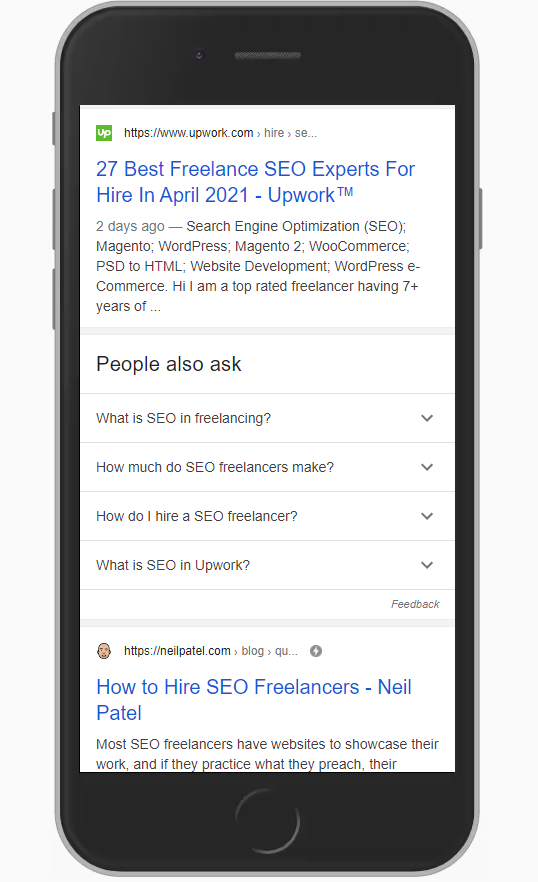
SEO freelancer query in Google - showing freelancer site UpWork with great visibility.
Big Freelance platforms tend to have good organic visibility for searches like “SEO freelancers”. They’re a great way to boost your own visibility as a freelancer too, at least whilst you're starting out.
As a business owner I might register at a site like UpWork or PeoplePerHour and trawl through the platform looking at SEO freelancers that I think could help me out.
Or - to skip this part - I could post my own Job Advert which specified exactly what I’m looking for.
Sadly if you are looking for clients through these freelancer platforms you will have to settle with all the competition here. Remember, as a freelancer that is able to work remotely with companies all over the world, this means you’re also open to competition from all over the world too.
In many cases, particularly for the lower-quality platforms like Fiverr or even UpWork, you’re not only competing against other SEO freelancers but also against some smaller SEO agencies.
Going up against an SEO agency on these platforms might seem like a strange concept - surely the company would rather work with a sole service provider, vs an agency with potentially hundreds of other clients?
Sadly many of these agencies are able to offer very cheap rates because they operate at such a huge scale, sometimes underpaying their staff members and burdening them with lots of work. Many business owners fall into the trap of choosing an SEO provider here based on their almost too-good-to-be-true prices.
There’s a huge temptation to lower your rates in order to pick up work. This is understandable as a new SEO without many glowing references to call upon, or if you’re lacking income.
But if you want to make a living from this then price-cutting is definitely something you have to avoid doing long-term or you’ll struggle to keep it up and to get out of that mindset.
My main advice is to find that first client, however hard it may be, and to do your best job possible. Document what you do, and what you’re able to achieve, and then turn that into a case study - with their approval, of course.
Armed with a few case studies like this, and some glowing references to use, you’ll start building up your own marketing material whilst hopefully picking up work by word-of-mouth referrals.
The Importance of Your Own Website as a Freelancer
I’m a big believer in letting your work do the talking. Instead of telling everyone how great you are at providing SEO, why not prove it to them?
Building out my own SEO consultant website, and working hard to optimise it in Google for terms that I believed clients would be looking for, has enabled me to slowly pick up enquiries organically over the years.
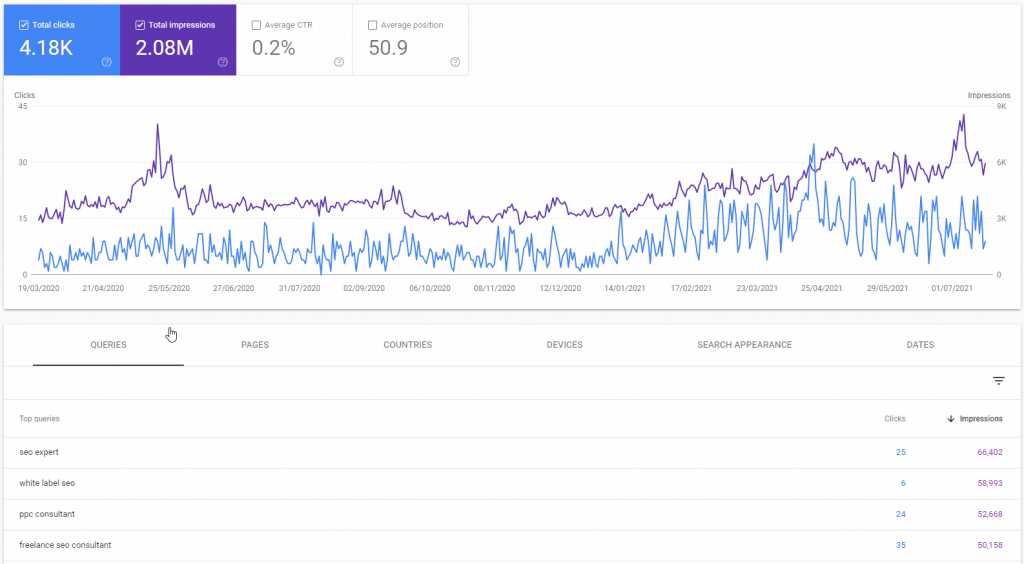
Organic queries for my own site during the past 16 months - nothing amazing but I've had some nice work that have come through my own website. Traffic definitely isn’t crazy, and my positions aren’t much to shout about, but my site has acted as a mini lead-magnet for me over the years.
Having people email you to ask for your (paid) help as an SEO is a pretty nice feeling - not only are you going to be able to convert some of those enquiries into ongoing clients, but you’re proving your own abilities to rank a website for some fairly competitive queries.
I've had a number of enquiries that read something along the lines of "I was looking for someone who can rank my site, and as you're obviously doing a good job yourself I imagine you know what you're doing." It's not a bad way to start the conversation.
If you are starting out I’d suggest trying to focus on optimising your website for your local area, optimising your site for terms like “SEO freelancer in {Cityname}”.
Getting a Google My Business listing is key in this regard, and you should definitely work towards optimising your listing and trying to pick up regular reviews from your clients.
Whilst many people will search for “SEO freelancers”, lots still have the habit of adding a specific location to the query - so “SEO freelancer in Bournemouth” for example.
I think there’s a trust element at play here - they want to find someone local, should they ever want to meet them.
As a side note I have had many businesses find me for local searches despite me not living there anymore. I was once based in Bournemouth in the south of the UK but I’m now living out in Galicia, Spain - so I get lots of Bournemouth-based businesses enquiring about my services.
I wouldn't want to target businesses here because of the language barrier; I'm more comfortable working with UK or English-speaking companies, at least for now.
Out of the 10+ years working as a freelance SEO specialist I can only remember one person that said it would be a problem for them that I’m not local. So, don’t sweat your exact location too much!
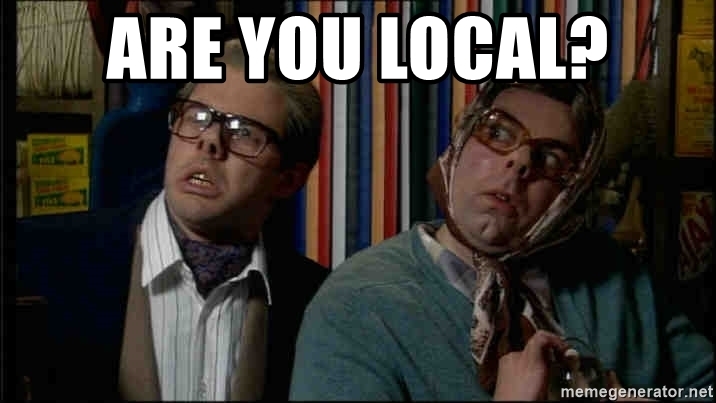
Thankfully no-one really seems to care if you're local or not anymore, when it comes to providing digital marketing services like SEO.
If I had to estimate exactly where I get most of my clients from, I’d say 70% or more arrive via my website. Some may be referrals, or from connections within my network, but a huge amount have come organically via Google.
Personally my preferred way of picking up a new client is via a personal referral or recommendation. This is where a business has recommended me to another, and so there’s a huge amount of trust there at the start of the relationship already.
When you get a cold inquiry or a cold lead, despite them reading about you and your services through your site, these businesses are usually contacting a handful of other SEO professionals.
So, you still have to jump through several hoops in order to impress the client, should you decide you’re going to be a good fit.
A lot of that hoop jumping and back-and-forth is eliminated when work comes through word of mouth or recommendations.
Is Working in SEO a Good Long Term Career Choice?
No one can predict the future. But the way things are shaping up, I’m confident there will be a lasting need for SEO specialists and Search Marketers in some shape or form.
What I love about this industry is that there are so many different areas to master.
You could focus on technical SEO - finding issues that might be preventing your website from being indexed correctly by Google.
Or instead you might instead want to focus on building links to websites, something which is another vital part of the SEO process.
There are many other areas to specialise in, and even more sub-niches within these areas. This is because website technology, and the internet, is ever evolving.
Nothing on the web stays static for very long - which makes for quite an interesting career!
Google in particular has a habit of making tweaks to their search algorithms, meaning certain factors might suddenly have more importance than others - Core Web Vitals or Page Experiences being a good example of this.

Core Web Vitals screenshot taken from https://web.dev/vitals/
For SEO professionals, Core Web Vitals represents a new challenge for many should they wish to ensure their clients “pass” the criteria recommended by Google.
Because technology is changing so rapidly, new opportunities are presenting themselves within the industry.
It was even suggested that with the recent Core Web Vitals update there will be a demand for very particular specialists who will be tasked with making websites more user-friendly and even faster to load, amongst other things.
So - with that in mind, I do think there is longevity as an SEO specialist, and there are a number of different areas in which you can specialise.
My advice would be to try and niche down as much as you possibly can. This will later make your own marketing much easier too - instead of speaking to everyone, you can tailor your message to a smaller group and allow yourself to be heard.
This is a lesson that was really drilled into me through Sophie Cross’ brilliant and free Nail Your Offering course for Freelancers & Creatives.
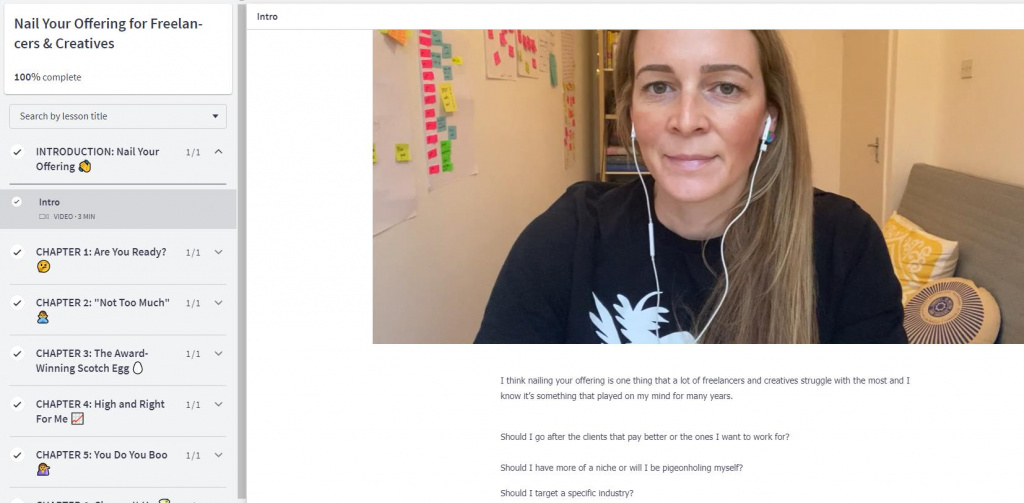
Nail Your Offering for Freelancers & Creatives Course by Sophie Cross of the Thoughtfully Marketing School
This is the kind of course I wish I’d found about 10 years ago!
Whilst I describe myself as a fairly broad SEO specialist, I do have a preference for the more technical side of things. But if I was to start my SEO career again I’d aim to pick a more specialist niche.
I've just started to slowly position myself as a growth specialist for eco and green brands, and that's something I'm only pushing on with now I'm in a fairly comfortable position professionally. I might not recommend that particular positioning from day 1.
For some SEO's that could mean describing yourself as someone who specialises in diagnosing and helping to fix JavaScript SEO issues (whereby JS can be problematic for search engines to crawl and render correctly).
If you’re a bit less technically inclined then you might choose to specialise in something more creative like link building in a certain niche, or as an onsite SEO specialist for another sector.
Whatever it is you decide to focus on as your offering, do try to make it as specific as possible - but don’t be afraid to pivot or change later, should you feel the need.
Enough from me - What do other SEO Experts think?
Side note to this article; originally this was written to be published on another freelancer site (they reached out to ask me to write the piece, I naively agreed, and then several months later they did a complete 360 with their content strategy - oops!).
I put out a bit of a sob story on Twitter and amazingly lots of very kind people offered to publish the article on their own sites.
That wasn't my intention - I just wanted to vent a little about what happened.
I quickly realised I couldn't decide where to post the story; how would I choose, by picking the one with the best domain rank?!
In the interest of fairness I thought I'd instead publish on my own blog here, and to try and invite other SEO's (including those that kindly offered to host my article) the chance to contribute some quotes instead.
For fairness I also shared a few requests for quotes from other SEO's I know of through Dan White's Brilliant Digital Marketing Union, and then through the magic of Twitter I was able to get a more diverse range of answers.
And that's where we are right now...
Dan White - Digital Marketing Consultant
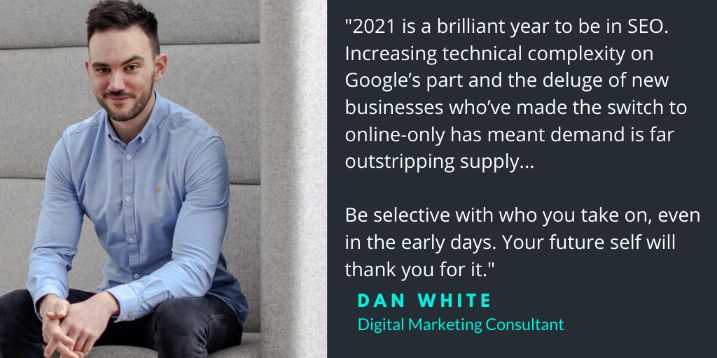
2021 is a brilliant year to be in SEO.
Increasing technical complexity on Google’s part and the deluge of new businesses who’ve made the switch to online-only has meant demand is far outstripping supply.
Although it’s a great position to be in when you’re starting out it can put you in a predicament where you want to accept every client that comes along; suddenly you find yourself booked out.
Take a step back - Do all these clients really tick the box with who they are and what they do?
Are they good people to work with and are they willing to pay your rates?
If you have a long term goal then are these people going to help you on your way?
Be selective with who you take on, even in the early days.
Your future self will thank you for it.
Dan White - Digital Marketing Consultant
Briony Cullin - Freelance SEO Consultant
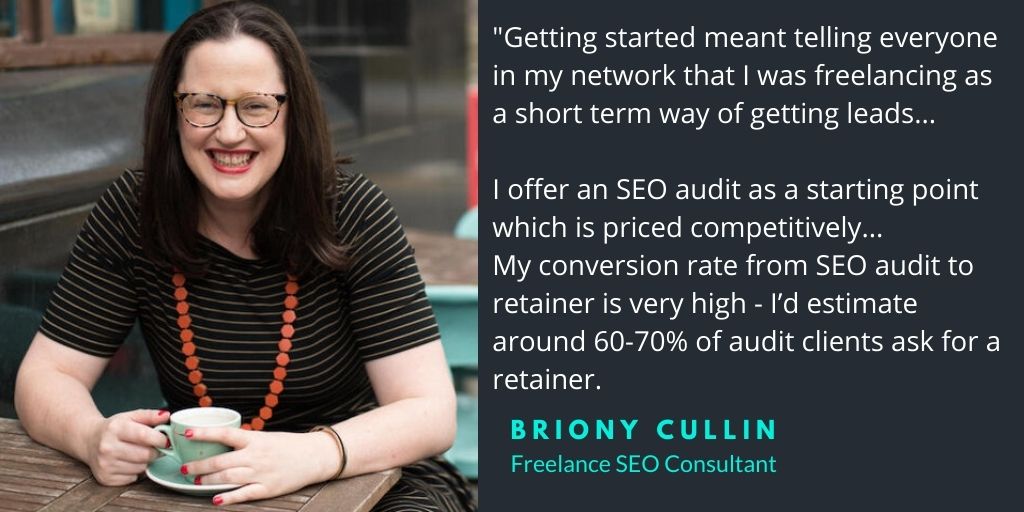
For me, getting started meant telling everyone in my network that I was freelancing as a short term way of getting leads, and then putting in the time and effort to my own website to build up organic traffic over time.
Word of mouth was so important to me when I was getting started.
I realised that people really needed to understand what I did and what I could offer for me to think of me when the need came up.
While people might not necessarily understand SEO, they knew that’s what I offered and that I could help them get more visitors to their website.
That meant that even from the early days, I was getting a lot of enquiries.
I also wanted to make it easy for people to work with me.
I offer an SEO audit as a starting point which is priced competitively, and allows the client to get to know my style of work and communication skills.
From there, they have the option of working together on a retainer on an ongoing basis.
My conversion rate from SEO audit to retainer is very high - I’d estimate around 60-70% of SEO audit clients ask for a retainer.
In terms of working on my own website in terms of SEO, I knew that ranking for “digital marketing freelancer” would be a useful search term and (at the time), it wasn’t overly competitive.
Once I’d been ranking for that term for a significant period of time, I felt brave enough to add that to my website home page as proof that I know what I’m doing: “I’m at the top of the Google rankings for my chosen keywords for my websites (go on, try Googling “freelance digital marketing” from anywhere in the UK – you’ll find me on page 1).”
I’m not great at bigging myself up in terms of my work but generally I find that this lands well with clients!
It took me a few years to really feel like I hit my strides with freelancing so it wasn’t a quick process at all.
I’ve done a lot of learning along the way and try not to make the same mistake twice!
Briony Cullin - Freelance SEO Consultant
Tadeusz Szewczyk (Tad Chef) - Blogger/Content Manager
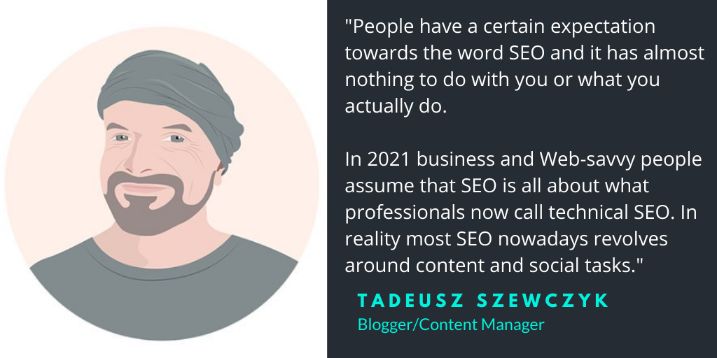
Do you know that old meme where you see several exaggerated pictures of how people imagine your line of work to be and finally you compare it to the often sad reality?
When it cones to freelance SEO this "what people think I do vs what I really do" meme is really apt.
People have a certain expectation towards the word SEO and it has almost nothing to do with you or what you actually do.
Even though the situation is far better than just a few years ago or the time when I started out in SEO in 2004 it's still a hard sell.
In 2021 business and Web-savvy people assume that SEO is all about what professionals now call technical SEO.
In reality most SEO nowadays revolves around content and social tasks. By social I don't necessarily mean social media but things like outreach.
You have to create excellent outstanding content and then you have to reach out to people who may be interested.
Ideally you reach out way before that and involve the people meant to spread the word upfront.
Just the other day I got approached by a head hunter who looked for an SEO consultant having experience with both front end and back end programming.
He wanted me to help them with their JavaScript framework.
I can code basic JavaScript myself, I learned back in 1999!
Yet I'm not a die hard nerd.
So when you specialize on SEO you will have to meet people's expectations.
They will expect that you do some hard core programming in many cases.
There are SEO people like these out there. I'm not one of them. Are you?
You don't have to be. Roughly 80% of actual SEO work is content and social SEO.
These roles are most likely called content manager or social media manager these days though.
That's why I use those terms as well to describe myself.
Tad Chef - Blogger/Content Manager
Silvia Martin - SEO Consultant & Founder at Trebole
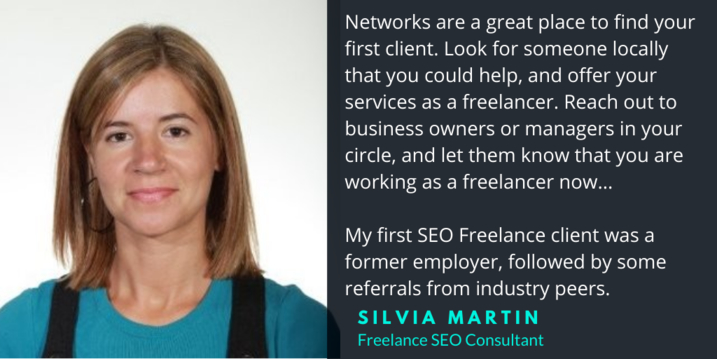
First of all, freelancing has many advantages but one thing that it’s very important to consider is that you won’t have a steady income every month.
That’s why It’d be better to have some savings before taking the leap to freelancing, because as every thing in life, the beginnings are difficult, until you’ll be more established, and you have a customer base.
Secondly, I think that networks are a great place to find your first client.
Look for someone locally that you could help, and offer your services as a freelancer.
Reach out to business owners or managers in your circle, and let them know that you are working as a freelancer now. Spread the word.
The main point for this strategy is that you are reaching out to people who know you already, so you don’t have to earn the trust.
In my case, I had 6 years of experience working as an SEO before taking the leap, both in-house and agency side, and my first SEO Freelance client was a former employer, followed by some referrals from industry peers.
However, don’t limit yourself to your current network, join local or online communities for digital marketers, SEOs, freelancers, start-ups, small business, etc... you never know where your next opportunity might come from.
Silvia Martin - SEO Consultant & Founder at Trebole
Danny Ashton - Founder/CEO of NeoMam Studios
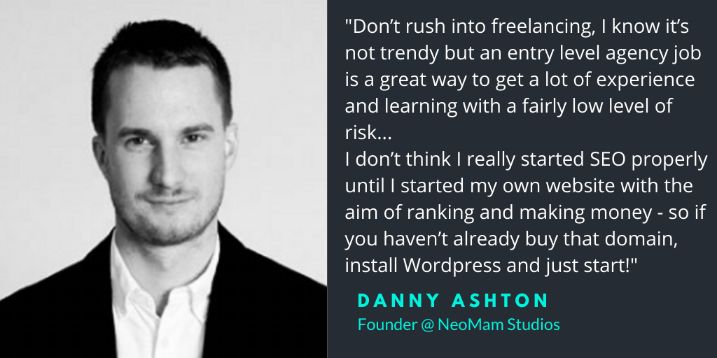
My first freelance client happened whilst I was still working in my full-time agency role and I would recommend you do the same.
It allowed me to try out “freelancing” without the pressure of having to earn enough to keep a roof over my head.
I honestly don’t think I really started SEO properly until I started my own website with the aim of ranking and making money - so if you haven’t already buy that domain, install WordPress and just start!
If you are not careful SEO can become very theoretical and whilst this might be useful for job interviews it won’t bring you many skills that are applicable to the world of freelancing.
Don’t expect your first site to make a ton of money but having a goal of $500 is a great way to put your skills to the test and see what areas you need to invest time in to improve.
Don’t rush into freelancing, I know it’s not trendy but an entry level agency job is a great way to get a lot of experience and learning with a fairly low level of risk.
Small agencies are great for experience and learning and big network agencies are good for building contacts/potential future clients - so try and do both.
The key thing you want to be aware of when doing a general SEO role are the tasks that you find fun/interesting.
When I started as an SEO executive, I really found the on-page SEO and technical stuff hard work but when I had my first taste of building links with content, I just knew it was the one thing I wanted to do.
My freelancing choice was really just a way for me to keep doing that one thing and not do all the other stuff that I didn’t enjoy as much.
So try to find the part about SEO you really enjoy so you can plan your freelance career around it.
It’s a cliche at this point but always be looking to increase what you charge.
Obviously there will be monetary benefits but you will also put off those that don’t value your work as much as others who do.
As a freelancer you have a maximum number of clients that you can work with, so you need to make sure you are doing what you can to work with the best clients for you - having a higher price is just one way of doing that but it’s highly effective and works at scale.
Danny Ashton - Founder/CEO of NeoMam Studios
Steve Morgan - Freelance SEO Consultant
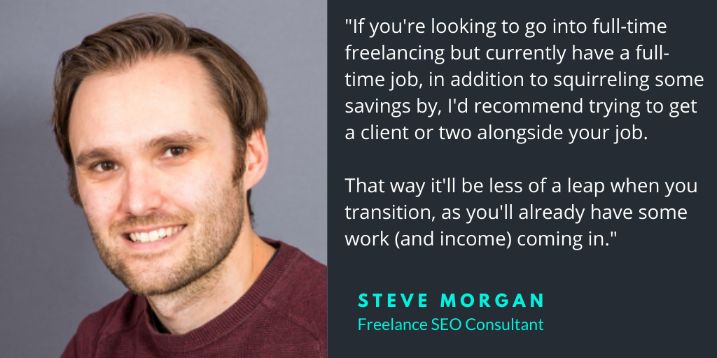
If you're looking to go into full-time freelancing but currently have a full-time job, in addition to squirreling some savings by, I'd recommend trying to get a client or two alongside your job.
That way it'll be less of a leap when you transition, as you'll already have some work (and income) coming in.
You can't rely on just offers or suggestions of work though - I made the mistake of transitioning from a full-time agency role into a full-time freelancer with zero clients, although I had about a dozen prospects.
But in reality, only one of those came off.
So I had a scary few initial months, haha - it was a good thing I had some money saved by.
So don't make the same mistake I did when I started out (if you can help it).
Steve Morgan - Freelance SEO Consultant
Verena Hallam - Freelance SEO Consultant
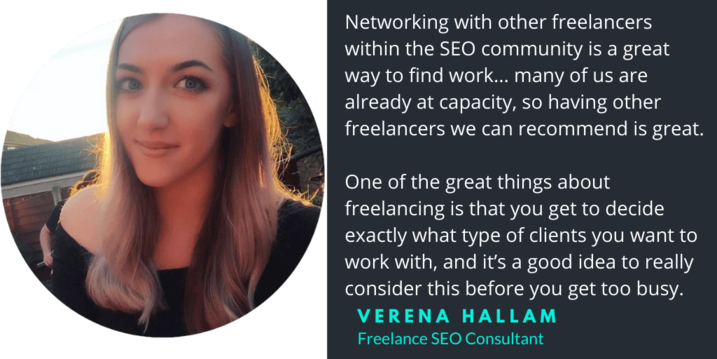
2021 is a fantastic time to be working in SEO, with more businesses than ever focusing on their online presence.
When considering making the jump to freelance, many people fear that there won’t be enough work to pay the bills, but in my experience there is more than enough work available, you just have to make sure people know that you’re available, and capable of getting results.
Networking with other freelancers within the SEO community is a great way to find work, as generally everybody is very supportive and happy to share advice or refer work.
Many of us are already at capacity, so having other freelancers we can recommend when a potential client gets in touch is great.
Utilise your existing network too, and let people in your personal life know that you’ve gone freelance, as you might be really surprised by who ends up passing work your way.
One of the great things about freelancing is that you get to decide exactly what type of clients you want to work with, and it’s a good idea to really consider this before you get too busy.
Try to resist accepting any and all work that comes your way in the beginning, and instead focus on working with clients whose products and services you really believe in and want to help succeed.
Verena Hallam - Freelance SEO Consultant
Nick Swan - Tech SEO & Founder at SEOTesting.com
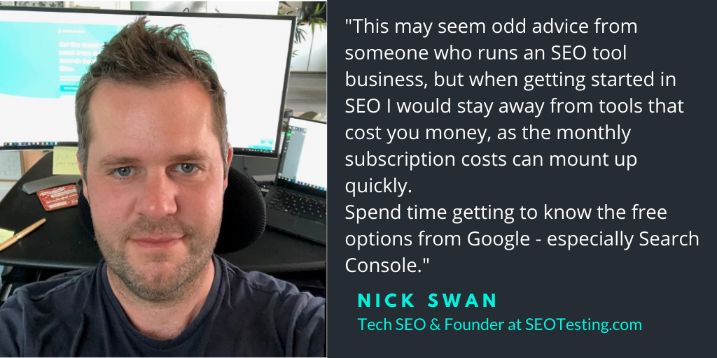
This may seem odd advice from someone who runs an SEO tool business, but when getting started in SEO I would stay away from tools that cost you money, as there are an awful lot, and the monthly subscription costs can mount up quickly.
Spend time getting to know the free options from Google - especially Google Search Console.
From a technical SEO perspective, use "view source code" in the browser to see how pages are put together using HTML and the structured data behind them, and definitely learn how to make use of Chrome Developer Tools.
Nick Swan - Tech SEO & Founder at SEOTesting.com
Charlie Williams - SEO & Content Strategy Consultant
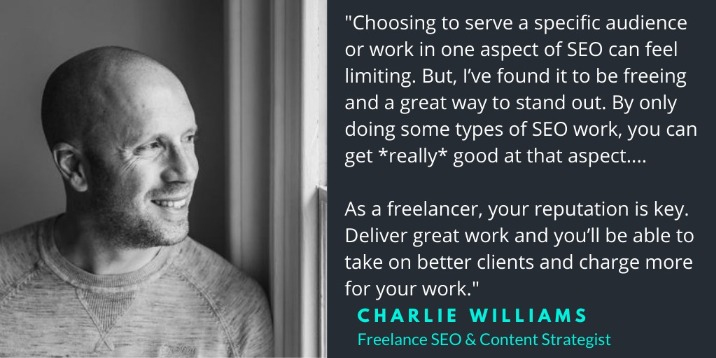
One question most new freelance SEOs have to answer is if they will specialise in some way.
My advice? Absolutely.
Choosing to serve a specific audience or work in one aspect of SEO can feel limiting. What if you cut off too much of your potential audience?
But, I’ve found it to be freeing and a great way to stand out. By only doing some types of SEO work, you can get *really* good at that aspect. And as a freelancer, your reputation is key. Deliver great work and you’ll boost that reputation, be able to take on better clients and charge more for your work.
On a practical level, specialising also lets you work in an area of SEO you love or for a set of customers you enjoy working with.
Like nothing more than solving crawling & indexing issues? Specialise in technical SEO. Want to help local businesses make the most of search? Work in local SEO. Have a passion for fashion? Become an expert in fashion ecommerce.
My other recommendation for new freelance SEOs is to dedicate time to learning.
When you work at a good agency, you’ll be pushed to learn. Either through working with others or agency training programs.
But, when you work for yourself, making time for learning is tough. It’s hard to turn off the critical voice in your head.
Shouldn’t you be working? I think that in SEO, learning is working.
Your job is to make recommendations based on industry best practices. And those best practices change. A lot.
So by not making time to keep up with the latest ideas or expanding your horizons, you are doing your client - and your reputation - a disservice.
Keeping yourself sharp through exposure to new ideas is a brilliant way to make sure you deliver value. And it can help shape your ideas for new products and services to offer.
Charlie Williams - Freelance SEO & Content Strategist
Claire Carlile - SEO & Digital Marketing Consultant
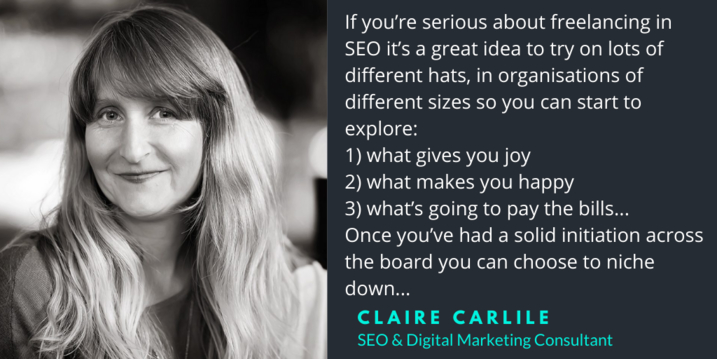
I started as a self employed digital marketer over 15 years ago and in that time I worked in a load of different verticals from accommodation to FMCG, for clients of varying sizes from micro businesses and agencies through to big international brands, on a range of pieces of the digital puzzle including technical SEO audits, content strategy, social media, e-commerce SEO, and what we used to call ‘link building’ (all hail unique article wizard ????).
I found that I was fair to middling at all of these things, and that having to LEARN ALL THE THINGS each time you got a new gig was exhausting, plus took a lot of (unpaid) time.
I think if you’re serious about freelancing in SEO it’s a great idea to try on lots of different hats, in organisations of different sizes so you can start to explore 1) what gives you joy 2) what makes you happy and 3) what’s going to pay the bills.
Once you’ve had a solid initiation across the board you can choose to niche down - that might be in the services you offer, or the types of clients that you service, or both.
Good luck! ????
Also, shameless plug - I wrote a course for BrightLocal Academy called "How to Land Your First Local SEO Client", which is pretty applicable to anyone setting themselves up freelance in a digital marketing service and covers defining your services, choosing your niche, pricing, positioning, pitching and much more.
Claire Carlile - SEO & Digital Marketing Consultant at Claire Carlile Marketing
TLDR - Life as a Freelance SEO in 2021
Thanks for making it to the end here - or for skimming ahead if you're a very busy and super-important person, such as myself.
Below is a bit of a summary of the above, combining largely my own thoughts, and that of some of the amazing SEO specialists I was lucky enough to include here:
- Niche down. Or not. I think a good suggestion is to go broad (at the beginning) but then niche down once you know enough, and that you know enough to realise exactly what you love to do. To paraphrase the lifestyle guru Marie Kondo, find work that "sparks joy".
- Don't neglect to tell your friends, business acquaintances, enemies, that you're becoming an SEO freelancer. It's not so that they pity you and send you work, but they genuinely might be able to help you out or to connect you to a suitable business in need of help.
- SEO is extremely broad. Eventually you will need to pick a specific area within, and master it as best you can. Don't become a Jack of All Trades, Master of None (something that cuts a little too close to the bone for me).
- Things change, including the internet. New opportunities arise, old ones disappear. Be happy with change, and if you're not happy with where you're at currently, why not pivot? No-one really cares if you do a bit of a 360. You're the one that matters at the end of the day - don't neglect to remember that.
- Everyone I know of is stacked right now with work. Long may this continue - but all things considered, I'd say the future of SEO looks fairly rosy.



